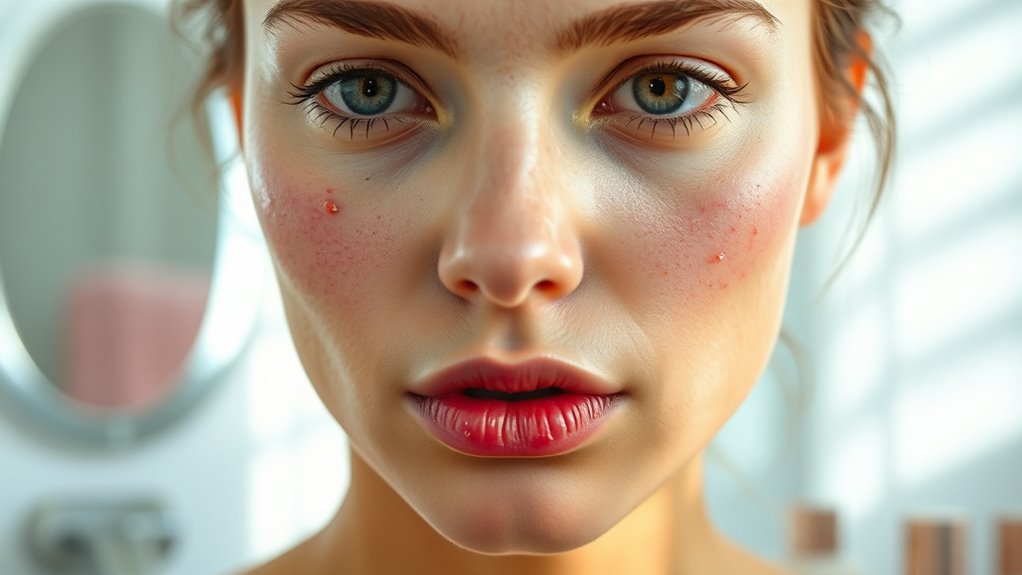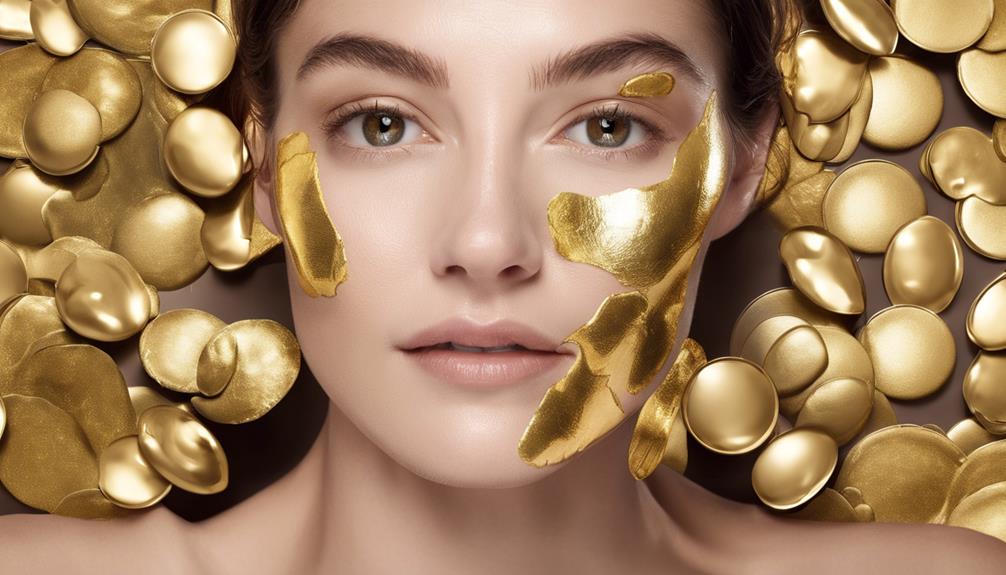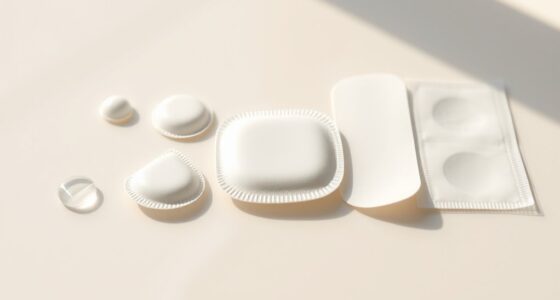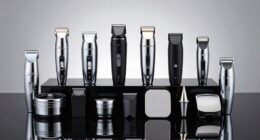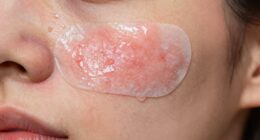Pimple patches won’t help your cold sores since they lack antiviral ingredients needed to fight the herpes simplex virus. They can actually trap moisture, promoting viral growth and delaying healing. Plus, the adhesive may irritate the sensitive skin around cold sores, causing more discomfort. Instead, look for antiviral treatments or protective options specifically designed for cold sores. You’ll find better ways to manage and prevent outbreaks as you explore further.
Key Takeaways
- Pimple patches lack antiviral properties needed to treat cold sores caused by the herpes simplex virus.
- They can trap moisture, potentially promoting viral replication and slowing down healing.
- The adhesive may irritate the sensitive skin surrounding cold sores, increasing discomfort.
- Pimple patches offer no therapeutic benefit for cold sores, which are highly contagious.
- It’s essential to use antiviral medications specifically designed for cold sore treatment instead.
Understanding Cold Sores and Their Causes

What causes those pesky cold sores that seem to pop up out of nowhere? Cold sores, or fever blisters, are triggered by the herpes simplex virus type 1 (HSV-1).
Around 30% of people exposed to HSV-1 will develop cold sores, which can spread easily through direct contact or sharing personal items.
Before the blisters appear, you might feel tingling, itching, or burning around your mouth—this is the prodromal phase.
While cold sores typically heal within three weeks without scarring, they can recur due to various triggers like stress, illness, or hormonal changes.
The herpes virus stays dormant in your nerve cells after an outbreak, making future recurrences possible.
Understanding these causes can help you manage and prevent outbreaks.
Symptoms of Cold Sores
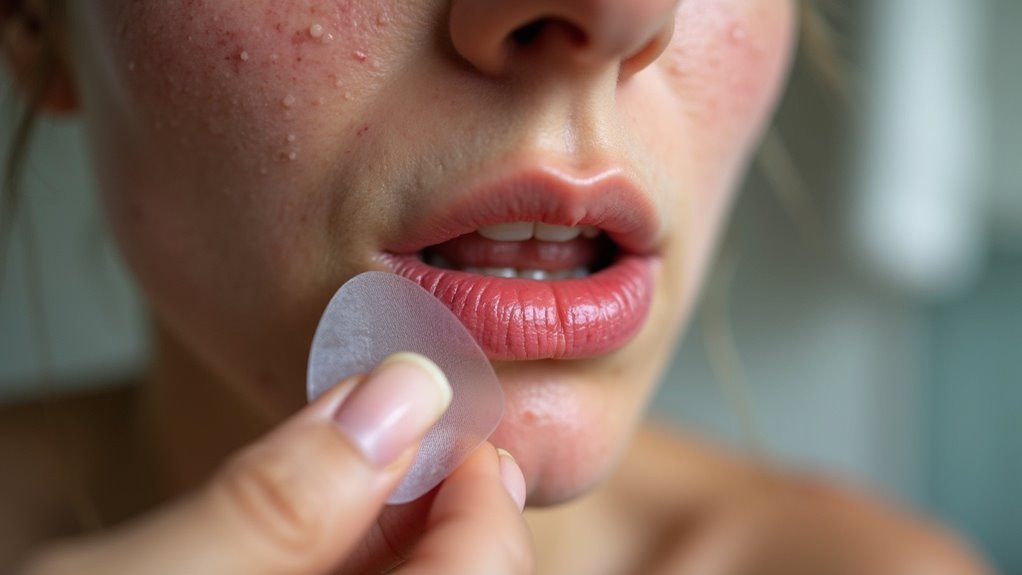
How can you recognize the onset of a cold sore? The initial symptoms often include a tingling, itching, or burning sensation around your lips and mouth. This prodromal phase signals that cold sores are on the way.
Once the blisters appear, they’re typically fluid-filled and can break open, leading to weeping sores. As these sores begin healing, they’ll dry out and form a scab.
Remember, cold sores are highly contagious, so it’s crucial to avoid direct contact during this time, even if symptoms aren’t visible. Healing usually takes about ten days, but it can vary depending on your immune response and any treatments you might use.
Being aware of these symptoms can help you manage cold sores effectively.
Differences Between Cold Sores and Pimples
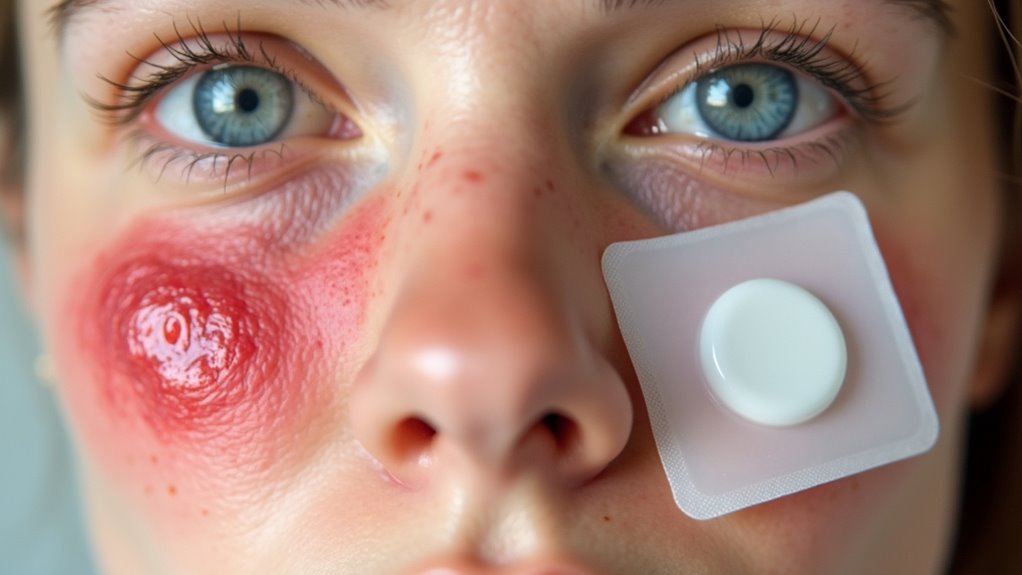
When you notice a sore on your lips, it’s important to know whether it’s a cold sore or a pimple.
Cold sores are caused by a virus and come with specific symptoms, while pimples stem from bacteria and clogged pores.
Understanding these differences can help you choose the right treatment and prevent spreading the infection.
Viral vs. Bacterial Infections
While both cold sores and pimples can be bothersome, they stem from very different causes and exhibit distinct characteristics.
Cold sores are caused by the herpes simplex virus type 1 (HSV-1), leading to fluid-filled blisters around your lips. They’re highly contagious, spreading through direct contact, even when no visible symptoms are present.
On the other hand, pimples arise from clogged pores and bacteria, making them non-contagious.
When it comes to treatment, cold sores require antiviral medications, while pimples typically respond to topical acne treatments like benzoyl peroxide or salicylic acid.
Additionally, cold sores may take up to two weeks to heal, whereas pimples can clear up more quickly, depending on the treatment used.
Symptoms and Appearance
Understanding the differences in symptoms and appearance between cold sores and pimples can help you identify what you’re dealing with. Here’s a quick comparison:
| Feature | Cold Sores | Pimples |
|---|---|---|
| Cause | Herpes simplex virus (HSV-1) | Clogged pores/bacterial infection |
| Appearance | Fluid-filled blisters | Red, swollen bumps |
| Location | Around lips and mouth | Face, back, or other areas |
| Symptoms | Tingling, burning, itching | Painful, inflamed |
| Contagious | Highly contagious | Not contagious |
Cold sores typically blister and crust over, while pimples may have pus. Recognizing these symptoms will help you manage your skin issues effectively.
Treatment Approaches Differ
Although cold sores and pimples may seem similar at first glance, their treatment approaches are quite different due to their distinct causes.
Cold sores, caused by the herpes simplex virus type 1 (HSV-1), require antiviral treatments like acyclovir or topical creams for effective healing, which can take up to three weeks.
On the other hand, pimples arise from clogged pores and bacterial infections, often responding well to acne treatments such as benzoyl peroxide or salicylic acid, leading to quicker healing.
While cold sores come with early symptoms like tingling or burning, pimples typically don’t give such warnings. Additionally, effective pimple patches can be a useful option for treating acne, as they absorb impurities and reduce inflammation.
The Role of Pimple Patches in Acne Treatment
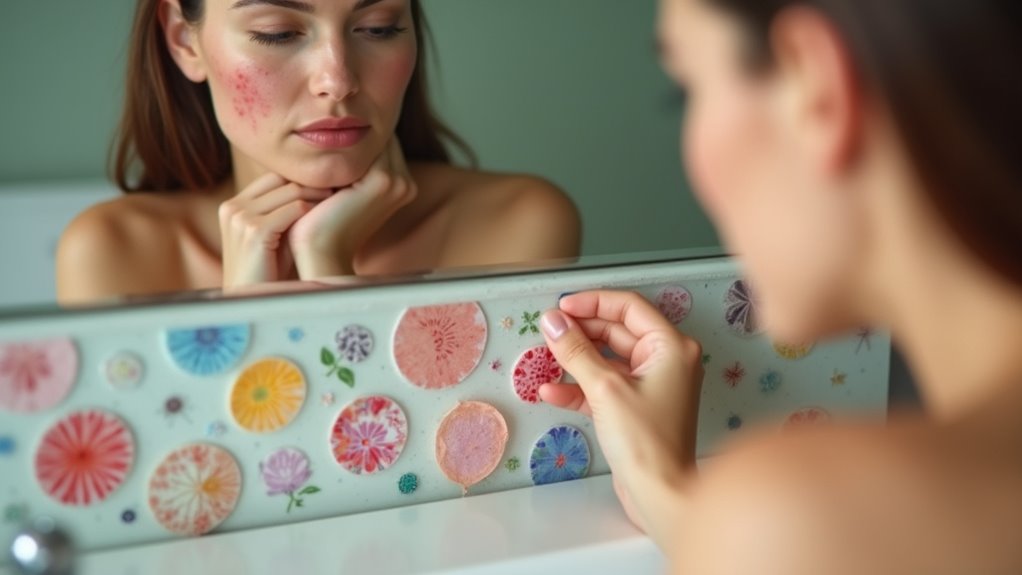
Pimple patches have become a go-to solution for those dealing with acne, as they effectively absorb excess oil and pus from lesions.
These small, adhesive hydrocolloid bandages create a moist environment that promotes faster healing while reducing inflammation and preventing scarring.
You’ll find that pimple patches work by protecting the affected area from dirt and bacteria, and they help you resist the urge to pick at your pimples, which can lead to further irritation.
Infused with active ingredients like salicylic acid or tea tree oil, they target bacteria and enhance your acne treatment.
While they may be comparable to cold sore treatment options like Acyclovir cream in healing time, their unique formulation makes them specifically beneficial for acne.
Why Pimple Patches Are Not Suitable for Cold Sores
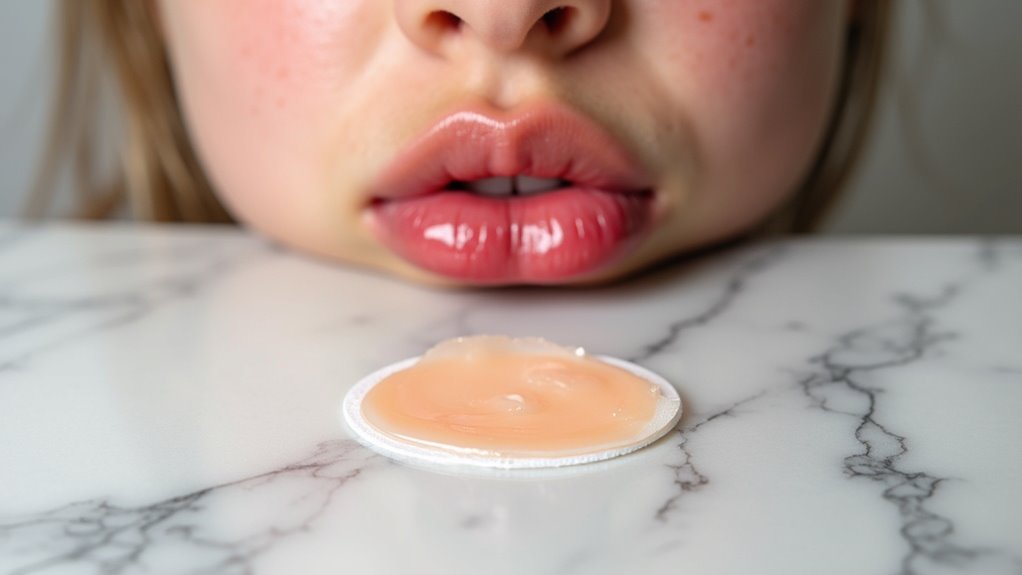
While pimple patches are a popular choice for acne treatment, they’re not suitable for cold sores. Here’s why you should skip them:
- Lack of Antiviral Properties: Pimple patches don’t treat cold sores caused by the herpes virus.
- Moisture Trapping: They can trap moisture, promoting viral replication and delaying healing.
- Skin Irritation: The adhesive may irritate sensitive skin around cold sores, causing more discomfort.
- Risk of Spread: Using pimple patches offers no therapeutic benefits and can increase the risk of spreading the herpes virus to other areas of your skin.
Instead, opt for cold sore patches with hydrocolloid technology or antiviral properties for effective management of cold sores.
Potential Consequences of Using Pimple Patches on Cold Sores
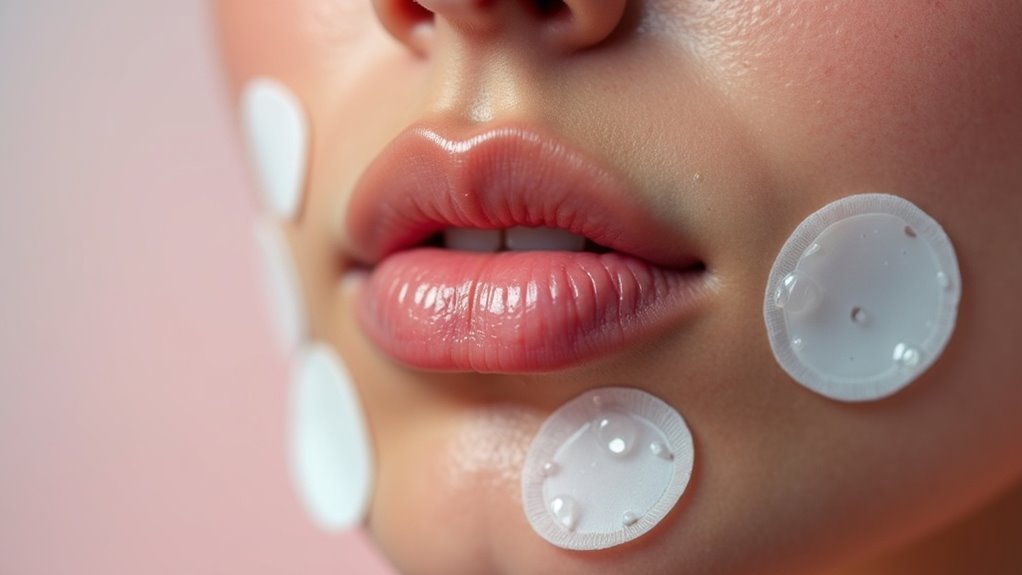
When you use pimple patches on cold sores, you might unknowingly exacerbate your condition instead of finding relief.
These patches lack the antiviral properties needed to combat the herpes simplex virus (HSV-1), which causes cold sores. Instead of helping, they can trap moisture, potentially promoting viral replication and prolonging healing.
The adhesive can irritate the sensitive skin around cold sores, leading to increased discomfort and irritation. Additionally, applying pimple patches offers no therapeutic benefit and may even increase the risk of spreading the virus to other skin areas.
Effective Treatments for Cold Sores
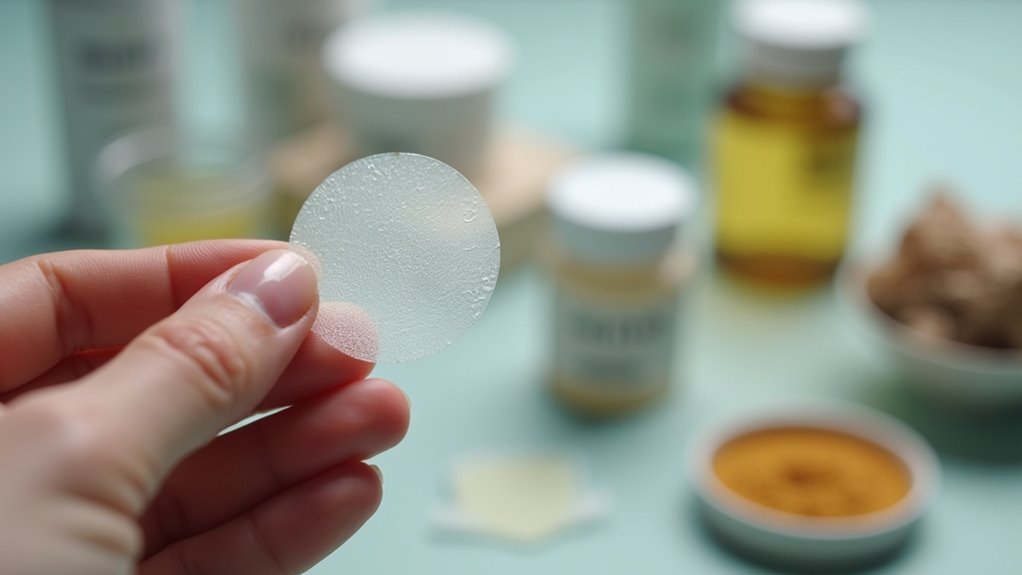
When cold sores strike, knowing your treatment options can make a big difference.
Antiviral medications like acyclovir and home remedies such as aloe vera can help speed up healing and ease discomfort.
Let’s explore how these approaches can help you manage outbreaks more effectively.
Antiviral Medications Overview
Antiviral medications are among the most effective treatments for cold sores, targeting the herpes simplex virus (HSV-1) to inhibit its replication.
Here’s a quick overview of what you should know:
- Acyclovir: A common antiviral that can be taken orally or applied as a topical antiviral cream.
- Valacyclovir: Often prescribed for its effectiveness in reducing outbreaks and speeding healing.
- Famciclovir: Another oral medication that works well during an outbreak.
- Topical creams: Products like penciclovir can alleviate symptoms when applied early.
Using these antiviral medications can greatly reduce the severity and duration of cold sores, making them essential for managing outbreaks effectively.
If you’re prone to frequent outbreaks, consider talking to your healthcare provider about suppressive therapy options.
Home Remedies Effectiveness
While antiviral medications are often the go-to for treating cold sores, many people seek relief through home remedies that can also be effective.
Aloe vera gel is a popular choice due to its soothing properties, while honey has been shown to promote healing better than some antiviral treatments. Cold compresses can alleviate pain and swelling, making outbreaks more bearable.
You might consider using Hydrocolloid Patches to protect the sore and speed up recovery. Plus, applying antiviral creams at the first sign of symptoms can greatly lessen the duration of cold sores.
Don’t forget to maintain good hygiene and use lip balms with SPF to prevent future outbreaks. These home remedies can be valuable tools in your cold sore management.
Alternatives to Pimple Patches for Cold Sores

If you’re looking for effective alternatives to pimple patches for cold sores, several options can help manage symptoms and promote healing. Consider these alternatives:
- Cold sore patches: These utilize hydrocolloid technology to address the viral nature of cold sores and speed up healing.
- Antiviral creams: Over-the-counter creams with acyclovir or docosanol can shorten the duration of outbreaks when applied early.
- Home remedies: Aloe vera gel and cold compresses can soothe discomfort and support healing.
- Consult a professional: If you experience frequent outbreaks, discuss suppressive therapy with a healthcare provider for long-term management.
These alternatives can effectively alleviate symptoms and help prevent spreading while you manage your cold sores.
Tips for Preventing Cold Sores

Managing cold sores doesn’t stop with treatment; preventing them is equally important. To prevent outbreaks, steer clear of known triggers like stress, fatigue, and sun exposure, which can weaken your immune system and provoke the virus.
Preventing cold sores is crucial; avoid triggers like stress, fatigue, and sun exposure to protect your immune system.
Regularly apply lip balm with SPF, such as Sun Bum Sunscreen Lip Balm or EltaMD UV Lip Balm, to protect your lips from sun-induced cold sore outbreaks.
Maintain good hygiene by washing your hands frequently and avoiding close contact with anyone who’s an active cold sore.
If you experience frequent outbreaks, consider discussing suppressive antiviral therapy with your healthcare professional.
Finally, during the prodromal phase—marked by tingling or itching—applying antiviral medications can help prevent the cold sore’s development and support the healing process.
Frequently Asked Questions
Do Pimple Patches Help Sores?
Pimple patches don’t help sores effectively. While they’re great for acne, they lack the antiviral properties needed for treating cold sores.
If you use them, you might end up irritating your skin even more. These patches can trap moisture, which could worsen the healing process and increase the risk of spreading the virus.
Instead, opt for cold sore patches designed to protect and promote healing without causing additional discomfort.
Are Patches Good for Cold Sores?
Patches aren’t good for cold sores. While you might think they could help, they don’t have the antiviral properties needed to fight the herpes simplex virus.
Instead, they can trap moisture and irritate the skin, worsening your discomfort. You should opt for patches specifically designed for cold sores, as they offer protection and often contain antiviral ingredients that promote healing.
Stick with treatments that target the virus directly for the best results.
What Is the Quickest Way to Get Rid of a Cold Sore?
To get rid of a cold sore quickly, start antiviral medications, like acyclovir or valacyclovir, as soon as you notice symptoms.
These can greatly cut down healing time. You can also use over-the-counter creams containing docosanol to alleviate discomfort.
Applying a cold compress or aloe vera gel can soothe irritation, but they mightn’t be as fast-acting.
Remember to avoid triggers like stress and sun exposure to help prevent future outbreaks.
Can You Put a Hydrocolloid Patch on Lips?
Putting a hydrocolloid patch on your lips isn’t a wise choice.
While these patches are popular for pimples, they lack the antiviral action needed for cold sores. Instead of helping, they might trap moisture, worsening your symptoms. You could end up feeling more discomfort instead of relief.
It’s best to choose specialized cold sore patches or antiviral treatments designed specifically for healing the herpes simplex virus effectively and safely.
Conclusion
To summarize, while pimple patches work wonders for acne, they won’t help with cold sores. Understanding the differences, recognizing the symptoms, and choosing the right treatments are essential. Instead of reaching for those patches, opt for targeted therapies, antiviral creams, or preventive measures. Prioritize your skin’s health, protect against outbreaks, and embrace effective solutions. By doing so, you’ll find relief, promote healing, and reduce discomfort. Keep your skin happy and informed!
